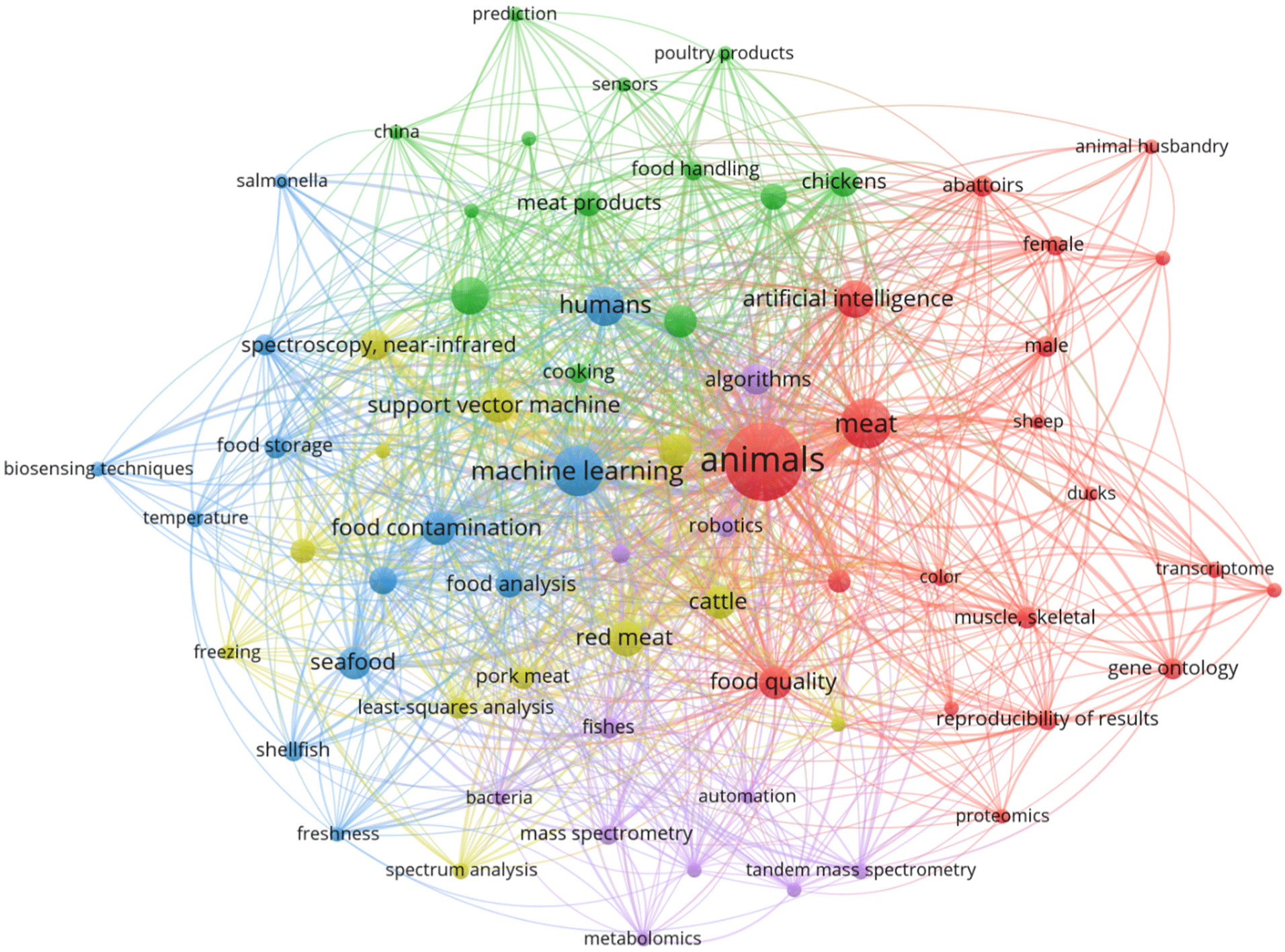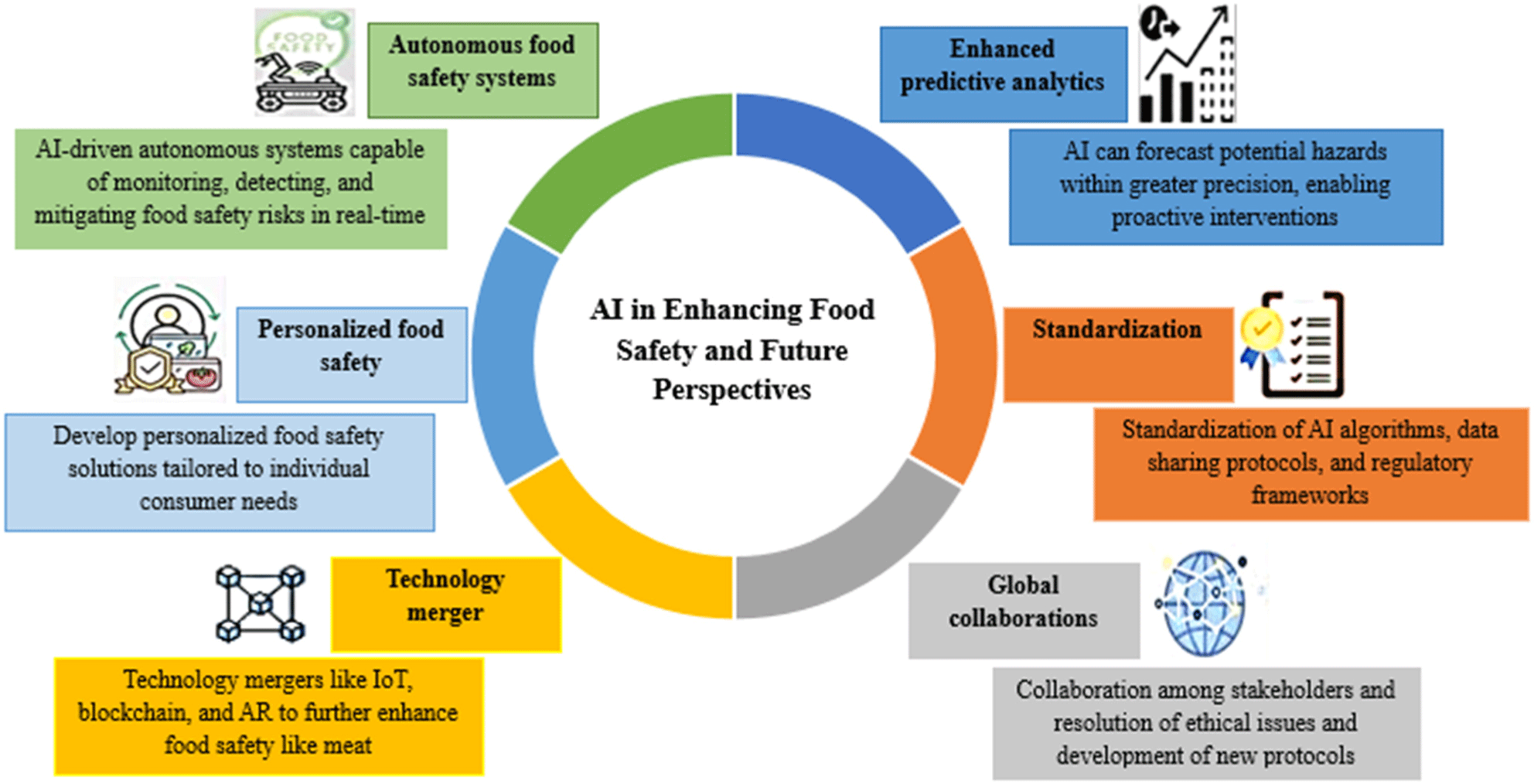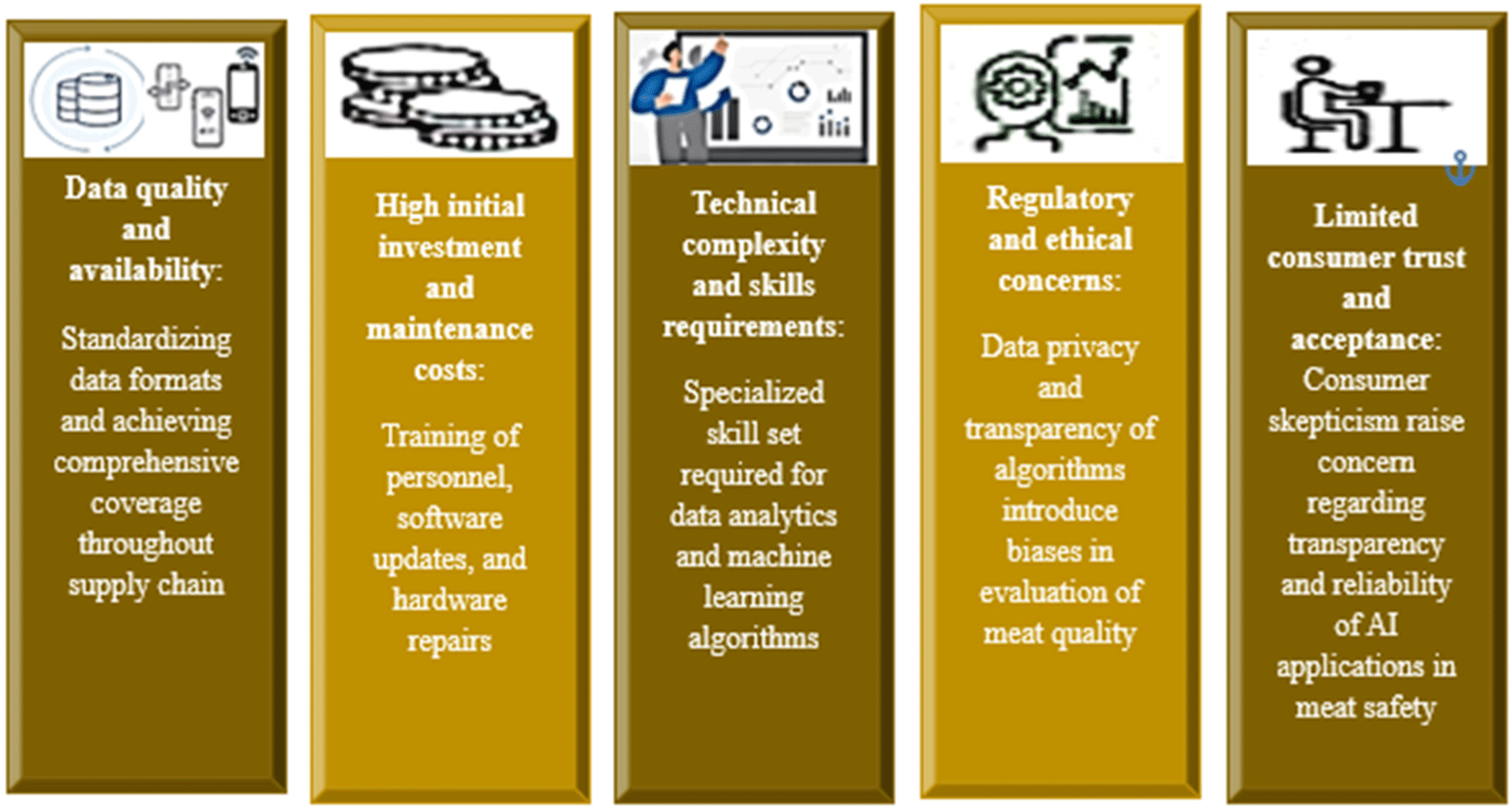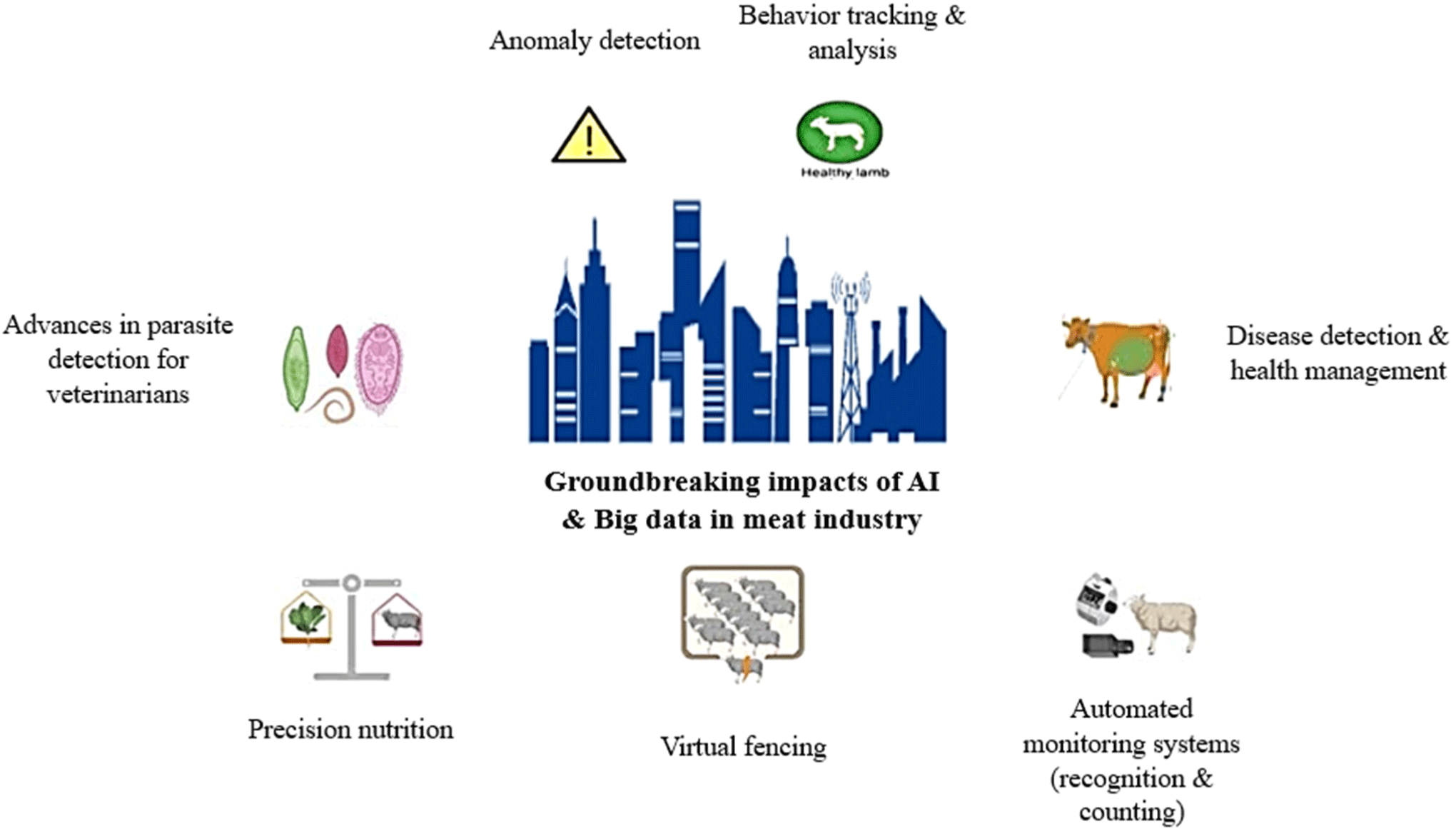Introduction
The world population is increasing rapidly (Samad et al., 2024a; Samad et al., 2024c). The demand for food is also increasing with the increasing population (Samad et al., 2024b). To fulfil this demand, there is a need for innovative solutions, which can be alternative foods (Samad et al., 2025) and avoid food wastage (Omar et al., 2024). Meanwhile, the quality of food should not be compromised. Meat is an important component of the human diet (Kumari and Abdul, 2024; Leroy et al., 2023). The quality of meat is one of the major concerns of consumers nowadays (Forgione et al., 2024). Consumers are well aware of meat safety and the quality of meat. There are several traditional methods through which we can evaluate the meat quality, but these methods are less efficient and time-consuming (Jo et al., 2024). Due to this, in the food industry, the demand for Industry 4.0 technologies has been accelerated, which involves the digital transformation and automation of the production process to reduce costs and enhance production quality (Jo et al., 2024). Artificial intelligence (AI) has proven to be the key industry-transforming tool while enabling exact freshness and safety parameter monitoring to fulfill dynamic regulatory standards. The steady evolution of the meat sector necessitates AI-driven assessment tools to achieve optimal meat quality (Alvarez-García et al., 2024). There are several problems in the preservation of meat products encountered due to varied microbial growth patterns found in different meat types (Anas et al., 2019; Talib et al., 2024). The integration between AI techniques and modern preservation solutions maintains continuous product safety along the supply chain (Dhal and Kar, 2025). Current meat preservation methods do not tackle the biochemical changes that substantially affect meat quality attributes. The persistent problem demonstrates strong reasons why new AI-based techniques must be used effectively to predict and analyze meat product spoilage. Advancements in modern technologies have become essential to improve both food quality and safety within the advancing meat industry (Hassoun et al., 2024).
Traditional meat quality assessment depends on human sensory perceptions combined with basic visual observation techniques (Olaniyi and Kucha, 2025). The assessment process through these techniques produces unreliable outcomes and human errors in determining meat freshness and quality levels. Traditional quality methods are not able to detect minor biochemical changes and the presence of microorganisms that can negatively impact total meat quality (Vasavada et al., 2020). Several problems with current assessment methods reveal that the food industry needs some AI-based tools and advanced technologies to measure meat quality. AI monitors and analyzes meat products in real time through advanced technologies like machine learning algorithms and computer vision. These technologies can detect the freshness and contamination in meat e.g., Electronic Tongue can be used to detect taste of meat using machine learning algorithm (Hossain et al., 2025).
Machine learning algorithms connected to hyperspectral imaging systems enable accurate monitoring of significant operative points during different procedures (Kang et al., 2022). Machine learning algorithms allow precise analysis of wide spectral data that hyperspectral imagery gathers through its identification process of anomalies and specific features with high accuracy levels (Al-Sarayreh et al., 2018). The integration proves especially useful for food testing and environmental oversight because it enables both thorough assessment and efficient processing. AI increases customer satisfaction and reduces food waste (Wafi and Tumiran, 2024). In the meat industry, these developments show huge potential in the development of modern quality assurance methods. Quality monitoring models based on AI are composed of predictive analytics and automation technologies, which enhance safety measures and increase shelf life (Chhetri, 2024).
This review briefly describes the role of AI in the assessment of meat quality, along with case studies and industrial applications of AI-related technologies. Furthermore, this review also sheds light on the challenges and limitations of using AI tools in the meat industry and also predicts the future of the meat industry in the shadow of AI-related technologies. There are several studies done on use of AI in meat industry as Fig. 1 shows the co-occurrence network derived from published literature on the topic of AI in meat industry for last 10 years while the major purpose of this review is to describe the effectiveness of modern technologies by reviewing the previously published literature on use of AI in food or meat industries.

The Role of Artificial Intelligence in Food Safety
The high levels of fat, protein, and moisture in meat make it susceptible to the growth of pathogens (Alam et al., 2025), so it is necessary to use an appropriate method to detect the pathogens and preserve meat from pathogens. In the food industry, the use of AI in machine learning is an evolutionary force (Zatsu et al., 2024). These days, AI has a huge role in the quality assessment of meat. Various parameters of meat quality can be assessed through these advancements by real-time monitoring (Sarker et al., 2024). Thus, AI is enhancing safety measurements and increasing the confidence of consumers (Rebezov et al., 2024). The use of predictive analytics by AI ensures the freshness of the product, extends shelf life, and identifies potential risks of contamination and spoilage in meat (Shehzad, 2025).
Systems powered by AI and machine learning are promising in the detection of microbes like Salmonella, Escherichia coli, and Listeria monocytogenes in food or meat (Sharma and Tharani, 2024). These models analyze biosensors, genomic sequencing, and microbial swabs and collect information to detect contamination (McGrath et al., 2012). AI can use past data to predict the potential spoilage during processing stages (Shehzad, 2025). Polymerase chain reaction and biosensor arrays are some fast tools for microbial detection. They minimize response time and ensure safety (Gao et al., 2024).
Computer vision systems powered by AI can detect surface-level abnormalities (Abinaya et al., 2024), e.g., bruising, abnormal pigmentation, and blood spots, which may be an indication of potential disease or contamination. These models scan real-time high-resolution images of meat products to detect any deviations from the safety limit (Olaniyi and Kucha, 2025). Robotic technologies are incorporated to automatically remove products that are not safe from production lines (Bernier, 2024). It does not require human intervention, which minimizes the risk of contamination.
Chemical residues like antibiotics, pesticides, and other unauthorized additives in meat products can be detected using algorithms of AI, which scan chromatographic data (Gbashi and Njobeh, 2024). AI models are given training to separate safe from hazardous chemical profiles even at trace concentrations (Feng et al., 2024). In addition to that, AI systems that can detect allergenic compounds are being developed to ensure proper labeling and to minimize the risk of cross-contamination (Adedeji et al., 2024).
Machine learning techniques are used to clean and disinfect equipment being used to process meat (Wang and Gu, 2024). AI can predict potential sanitation failure and contamination by scanning data from various processing zones (Taweesan et al., 2024). This ability to predict possible safety hazards ensures maintenance and minimizes the risk of contamination due to equipment malfunction.
AI is being merged with blockchain technologies to produce traceability data that ensures the quality of meat products (Ellahi et al., 2025). AI tools scan data from every stage of processing and produce data that is traceable and gives all the information about the meat products (Biglia et al., 2022). There are several AI tools related to the meat industry discussed in Table 1. Deliveries are delayed when factors like temperature fluctuate, the system automatically suspends them for review. This allows transparency and rapid action to be taken when safety hazards occur.
| Areas in meat industry | AI tools | References |
|---|---|---|
| Production | - Artificial neural networks (ANNs) - Agent-based systems (ABSs) - Data mining - Fl/modeling - Case-based reasoning - Swarm intelligence (SI) - Genetic algorithm (GA) - Decision trees - Gaussian |
Sharma et al. (2021) |
| Marketing | - ANNs - GA - ABSs - SI - Trees-based models - FL/modeling - General forms of AI |
Alawadh and Barnawi (2022) |
| Supply chain | - ANNs - FL/modeling - GA - SI - Data mining - Bayesian networks - Stochastic simulation |
Sharma et al. (2021) |
| Logistics | - ANNs - Data mining - Automated planning - Heuristics - Simulated annealing - ABSs - Robot programming |
Sharma et al. (2021) |
Natural language processing is now used to make regulatory document analysis, audit preparation, and compliance reporting automatic (Fuchs, 2021). AI models can scan inspection reports, food safety audits, and HACCP documentation to ensure alignment with international standards like ISO 22000 and FSMA (Chhetri, 2024). These models help manufacturers to maintain safety protocols by highlighting inconsistencies and recommending corrective actions.
Challenges and Limitations of Artificial Intelligence in Meat Quality Assessment
AI-driven technology implementation faces multiple barriers that restrict its widespread use in meat industry optimization, as well as meat safety and freshness monitoring operations. The successful application of new technology depends on knowing all associated difficulties.
Data availability remains a major challenge due to a shortage of well-annotated, high-quality datasets (Barbar et al., 2022). The effective learning ability, along with the accurate prediction power of AI models based on machine learning and deep learning, depends on large quantities of available data. Such datasets in the meat industry encompass high-resolution images along with sensory profiles as well as microbial loads and environmental parameters (Matenda et al., 2024). Different processing units present inconsistent data that is unstandardized and fragmented during collection processes (Saitone et al., 2024). Commercial confidentiality, along with privacy matters, makes data sharing between industry stakeholders difficult. AI models become error-prone across different scenarios because a single data framework unification is absent, thus limiting their generalizability potential and robustness characteristics.
Businesses, especially those in the small and medium-sized enterprise category, need to invest significant money to implement AI-based technologies (Zavodna et al., 2024). The acquisition of sensors and imaging equipment, along with data storage infrastructure and software licenses, is very expensive and a financial obstacle for most companies. The lack of appropriate technological foundation and application capacities causes substantial challenges to meat processing facilities when they attempt to implement real-time AI systems (Wang and Li, 2024). The digital difference between digital adopters and traditional evaluators creates implementation barriers for AI because experts use manual methods instead of AI (Pham and Nguyen, 2023). At the same time, system maintenance costs produce a net loss in performance sustainability.
Change resistance functions as a substantial cultural and organizational challenge within the meat industry. The meat industry has relied on visual inspections along with manual grading for a long ago because its personnel trust these traditional procedures (Edwards et al., 1997). Workers show resistance to AI implementation because processes need workflow improvements as well, and positions will require fewer human employees (Barbar et al., 2022). The industry workforce faces a large deficiency of necessary skills because many professionals lack basic expertise in AI, along with data science and digital technological competency (Akyazi et al., 2020). The companies lack programs to educate and develop competencies in new practices, so the workforce will struggle to adopt modern technologies.
Use of AI raises ethical and legal concerns that need to be addressed (Manning et al., 2022). From people’s point of view, AI algorithms are ‘black boxes’ because their decisions are not clearly explained to food consumers (Rawashdeh, 2023). The explanation of AI decisions is challenging when critical areas like food safety are concerned. There is also a chance of legal uncertainty over the responsibility if the quality of meat is incorrectly assessed due to errors in AI technology. In Southeast Asia and the United States, the regulatory system has gaps, and there are unclear safety rules. The rules regarding data ownership are undefined, which leaves stakeholders in a confused space.
Case Studies and Industrial Applications
In numerous sectors of the meat industry, AI is now used for the assessment of quality. In research institutes, AI technology is employed to monitor and ensure safety. By given case studies, this review shows that AI can cause a revolutionary change in the meat quality assessment market. Furthermore, recent research and practical implementations highlight various applications of AI in the meat industry, as summarized in Table 2.
| Application area | AI techniques | Key outcomes | References |
|---|---|---|---|
| Meat quality assessment | Convolutional neural networks (CNNs) | Successfully attained accuracy in the classification of the freshness of meat with improved performance compared to traditional techniques. | Elmasry and Abdullah (2024) |
| Meat freshness detection | Ensemble of shallow CNNs (ConvNet-18 and ConvNet-24) | ConvNet-18 achieved 99.4% accuracy; ConvNet-24 had 96.6% accuracy in classifying degrees of freshness of meat. | Elangovan et al. (2024) |
| Non-destructive meat quality evaluation | Airflow pulse and 3D structured light imaging with AI models | Provided real-time, non-invasive prediction of tenderness in meat with a very high level of accuracy (correlation coefficient may reach 0.975). | Luo et al. (2023) |
| Food safety risk prediction | Machine learning, deep learning, transformers (e.g., BERT, RoBERTa), explainable AI (XAI) | Better prediction of food safety risk by enriched datasets; XAI techniques enhance model transparency. | Food Safety Magazine (2025) |
| Food safety monitoring | AI-driven sensor systems | Optimized cleaning processes in food production because it was able to detect residual microbes and sanitation on equipment. | Smart Food Safe (2025) |
| Early detection of foodborne illness outbreaks | Natural language processing (NLP) on public data | AI analyzed online reviews to provide early warnings of foodborne diseases outbreaks, aiding rapid response. | Smart Food Safe (2025) |
| Food safety risk assessment | Deep learning with categorical embedding | Predicted food safety issues with accuracy ranging from 74.08% to 93.06% using EU data. | Nogales et al. (2020) |
The quality assessment of meat using AI is in its early stages in the slaughterhouse industry. Denmark Crown is a famous company in Europe that processes meat. It has an AI-powered computer vision system that utilizes AI algorithms to grade carcasses automatically (Neuro Space, 2023). Advanced technological models utilize high-quality images to monitor various factors like muscle color analysis, fat distribution, and assessment of faceplate (Leighton et al., 2022). Subjective grading errors that occur while manually inspecting have been reduced due to the incorporation of AI. This automation has enhanced operational efficiency and the reliability of the product.
During the packing of meat, safety and freshness are top priorities (Ahmed et al., 2018). The Australian Meat and Livestock Association has successfully tested hyperspectral imaging and AI-powered predictive systems to analyze meat freshness, demonstrating the effectiveness of AI-based technologies in assessing meat quality (Meat & Livestock Australia, 2020). AI-based technologies can give on-spot evidence of contamination by analyzing microbial distribution and changes in color (Soni et al., 2022). These technologies can also pinpoint potential quality issues that can happen while the product is being sealed. Furthermore, by linking these technologies to smart packaging, huge progress has been made in terms of the impact of the environment on food shelf stability.
Several meat processing companies employed AI technologies for complete quality control initiatives both before and after packaging operations. The major American meat producer, Tyson Foods, teams up with technology companies to establish machine learning models for enhancing manufacturing line performance (Oller, 2021). The AI-based system collects data from temperature sensors, humidity devices, and consistency indicators, which are processed in real-time to modify processing adjustments through AI-based analysis models. Through these proactive measures, the procedures achieved superior production results and decreased power utilization while maintaining uniform product qualities. JBS S.A., which operates as one of the world’s largest meat processing companies, has launched AI-based traceability solutions that generate a link between product quality assessments and their supply chain stages (MorningAgClips, 2023). The integration of AI assessments with blockchain technologies at JBS provides clients with secure and tamper-proof systems to track product origin and condition, especially when meeting export requirements and building trust with consumers.
In addition to startup enterprises, academic research labs, startups, and academic research facilities have made substantial AI advancements in meat science. ImpactVision and OptoScale bring their AI-powered inspection equipment to processing lines so they can operate an AI-based processing system (Burwood-Taylor, 2018). Small processing companies benefit most from these tools because they require an alternative to large automated systems that remain out of reach. Cutting-edge research programs at universities across Korea, Germany, Japan, and the Netherlands.
Future Trends and Innovations
AI technology advances rapidly to change the meat industry dynamically, so its future implementation in meat quality assessment looks promising. The future of food systems technology integration will bring advances in real-time system tracking, automated operations, predictions, and sustainable practices. The future developments will serve to enhance food safety measures while decreasing food waste and strengthening public trust.
The most promising trend emerges from the combination of AI with the internet of things (IoT). Through this integration, smart meat monitoring systems enable the collection and analysis of data from continuous supply chain operations (Bhuiyan et al., 2024). Real-time monitoring of temperature, humidity, and pH levels is possible because sensors are placed inside packaging units or storage containers (Dodero et al., 2021). The integration of AI algorithms with these data streams enables them to predict spoilage situations alongside quality SDs. Through this innovation, both food safety and the monitoring systems for cold chain, as well as traceability capabilities, improve, which boosts regulatory adherence and facilitates international trade.
Consumers and regulators are demonstrating the growing interest in products with clear origins and detailed reliability mechanisms (de Araújo et al., 2022). The integration of blockchains along with AI systems builds tamper-proof databases that track the whole process of meat production and supply (Duan et al., 2024). The verified blockchain data can be processed by AI software for pattern recognition to authenticate products while tracking quality changes through time. Improved reliability of supply chain information allows stakeholders from production through to processing, retailing, and consumption, which creates sound accountability in meat initiatives.
Non-destructive testing advanced imaging tool, e.g., Integrating Terahertz Imaging 3D scanning and hyperspectral camera systems to achieve the best performance level in improving meat quality (Wu et al., 2022). These technologies, working with AI, enable artificial nondestructive product evaluation based on various product attributes, including marbling tenderness and microbial levels (Shi et al., 2021). New system developments are expected to achieve ultra-fine analysis combined with rapid processing and economical operation to enable widespread processing facilities.
Future advances in AI can minimize environmental impact and lower consumption of energy (Pimenow et al., 2024). Sustainable AI systems can help in the development of green meat assessment systems. Circular food systems can be developed using AI that can manage resources in a better way and can predict overproduction (Namkhah et al., 2023).
Comparative Analysis
Quality assessment of meat has advanced a lot from old-school inspection due to the incorporation of AI systems. Comparison between traditional methods and AI methods in the assessment of meat products is shown in Table 3.
Advantages and Disadvantages of Artificial Intelligence Approaches
An AI-powered system of assessment has various advantages over traditional methods. AI-powered systems give fast results while human-based sensory interpretation is inconsistent and slow. These systems provide reliability when measuring texture conditions, microbial count and color distribution (Wang and Li, 2024). AI-powered models process data rapidly, which allows immediate collection of feedback (Zatsu et al., 2024). The immediate system of assessment reduces production delays. Incorporation of predictive analytics allows stakeholders to detect quality issues in advance, which enhances customer safety (Sarker et al., 2024). AI technology gives businesses an automatic system that does not require training. Incorporation of AI models in manufacturing can minimize the engagement of employees in the manufacturing process. Furthermore, the impact of AI on the meat industry is discussed in Fig. 2, and the advantages of using AI in the meat industry are discussed in Fig. 3.

Although AI has a lot of advantages, it faces obstacles in deployment. The first obstacle is the expense. AI projects are very expensive (Qiao et al., 2024). The infrastructure containing advanced computing systems can be extremely expensive for small companies. In addition to that, the AI models rely on high-quality and extensive data sets (Zhuang et al., 2017). The meat industry lacks proper data sets, thus AI models are unreliable due to a lack of sufficient information. A huge disadvantage of AI models is their black-box system, which gives no access to the decision-making pathways (Rawashdeh, 2023). When dealing with critical sectors like food safety, where traceability is required, these unexplained AI systems have a huge drawback. Further challenges to implementing AI are shown in Fig. 4.

Conclusion
The use of AI for the assessment of meat quality has revolutionized research and industry environments. This review highlights various applications of AI technologies while focusing on the role of machine learning, predictive analytics, and computer vision in the improvement of food safety. Advanced imaging systems, real-time data analytics, and complex programming models have major advantages over traditional manual quality and sensory assessment. The biggest advantage of AI is its ability to maintain objectivity. The incorporation of AI models minimizes human error. It gives consistent and reliable results. Monitoring of parameters like color, texture, and detection of microbial load in real-time increases the accuracy of quality control systems. It also forecasts spoilage risks. The ability to make early predictive interventions is crucial because it supports both food safety and shelf life extension with waste reduction, thus benefiting the core standards needed in meat processing.
The review shows that both traditional assessment methods and AI approaches exist. However, traditional methods should continue being used with the involvement of AI because they represent decades of quality assessment foundations, yet modern supply chain requirements exceed these traditional methods’ speed and ability to adapt. AI excels at fast data processing of large datasets, thus maintaining control over meat products to meet industry and consumer requirements. These technologies will achieve success when multiple obstacles are solved. Data quality problems, infrastructure expenses, workforce change challenges, and ethical concerns need immediate solutions and attention. AI in meat quality assessment will fail to reach its maximum potential unless the existing barriers are successfully addressed. Multiple industries expect to achieve additional revolutionary potential by combining innovative technology elements such as IoT sensors, blockchain systems for tracking purposes, and AI robotic enhancements. New market developments will enhance manufacturing operations and supply complete quality profile data, guaranteeing transparency for consumer meat product safety assessment.
Furthermore, this review also presents future recommendations that may help to predict the future of the meat industry. Standardized high-quality datasets need to be created immediately to use AI-based technologies in the meat industry. The meat industry should develop educational programs and collaborative networks to create ongoing employee learning opportunities, which will help employees in learning AI-related knowledge. All industries must work together to build effective regulatory guidelines that define data protection protocols, moral standards, and responsible AI uses in food safety systems.














